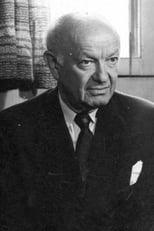Tenen Holtz
Elihu "Elye" Tenenholtz was born in the Russian hamlet of Azran, near the city of Rovne, in 1887 and came to the US at the age of ten. His first appearance in amateur Yiddish theatricals occurred in 1903, in staged readings of the works of Yiddish author Sholom Aleichem, the first person to do that. He augmented his theater appearances by writing for and editing a Yiddish satirical magazine under the pen-name "Moishe McCarthy". In 1916 he made the leap to the professional Yiddish stage and, befriended by the great doyenne Bessie Thomashevsky, helped her pen her memoirs, the first publication documenting a Yiddish actor's life. By 1920 he was appearing on both the Yiddish art stage with Maurice Schwartz and on Broadway, quickly rising to the top leadership of the Hebrew Actors' Union, the first arts union in America. In 1925 he co-founded a theater company with Celia Adler, half-sister of Luther Adler and "Method" teacher Stella Adler. In 1926 he was summoned to Hollywood and given a five-year contract at MGM. Like most Jewish actors, when he arrived in Hollywood he changed his name (choosing to bifurcate it into "Tenen Holtz"). During that time he regularly appeared in films alongside such stars as Greta Garbo, Norma Shearer, Joan Crawford, Jean Harlow and Marion Davies and under directors like King Vidor and Victor Fleming. This period would prove to be Tenenholtz's most prolific and would account for the majority of the 50+ films in which he would appear.
While in Hollywood he helped jump start its fledgling Yiddish theater, founding a popular Yiddish theater company that included other transplanted Yiddish actors including Muni Weisenfreund (aka Paul Muni, father and son Rudolph Schildkraut and Joseph Schildkraut. When his contract at MGM ended, he moved over to Warner Brothers where he made films with Leslie Howard under the direction of Michael Curtiz. By the late 1930s the only calls he got were from Poverty Row studios, so Tenenholtz moved to nearby Monrovia and opened a chicken ranch. Though he would occasionally go back in front of the camera, he retired from film. By the time TV emerged, he landed a few roles on shows such as Perry Mason (1957) and Alfred Hitchcock Presents (1955). He died in 1971.
Acted in
The Barbara Stanwyck Show
1960
as Bronsky
Peter Gunn
1958
Perry Mason
1957
as Mr. Gilfain
Perry Mason
1957
as Otto Joseph
Alfred Hitchcock Presents
1955
as Sol Dankers
Henry Goes Arizona
1939
as Boris - a Ranch Hand (uncredited)
Mutiny on the Blackhawk
1939
Bridal Suite
1939
as Hotel Runner at Train Station
Let Freedom Ring
1939
as Hunky (uncredited)
Cipher Bureau
1938
as Simon Herrick
International Crime
1938
as Starkhov
Nothing Sacred
1937
as Tearful Waiter (uncredited)
British Agent
1934
as Lenin
The Notorious Sophie Lang
1934
as Bystander (uncredited)
Hollywood Mystery
1934
as Benjamin Vogel
Money Means Nothing
1934
as Mr. Silverman
Dinner at Eight
1933
as Butler (uncredited)
The Chief
1933
as Bald Henchman at Cabin
Big Executive
1933
as Pawnbroker
Bombshell
1933
as White - Lola's Agent (uncredited)
Broadway to Hollywood
1933
as Booking Agent
Hard to Handle
1933
as Tailor (uncredited)
Whistling in the Dark
1933
as Herman
Faithless
1932
as Diner Proprietor
Cock of the Air
1932
as Tall Waiter
Devotion
1931
as Waiter
Sporting Blood
1931
as Gus, Bald Gambling Mobster (uncredited)
Laughing Sinners
1931
as Poker-Playing Salesman
Gentleman's Fate
1931
as Tony
All Teed Up
1930
as Senator Brown
Whispering Whoopee
1930
as Mr. Holtz
The Kibitzer
1930
as Meyer
Lilies of the Field
1930
as Paymaster
House of Horror
1929
as Brown
The Duke Steps Out
1929
as Jake, Duke's manager
Show People
1928
as Casting Director
The Ol' Gray Hoss
1928
as Man with Sooty on Face
The Cardboard Lover
1928
as Albine
Detectives
1928
as Orloff
The Trail of '98
1928
as Mr. Bulkey
Bringing Up Father
1928
as Ginsberg Feitelbaum
The Garden of Eden
1928
as Headwaiter at Palais de Paris (uncredited)
The Latest from Paris
1928
as Abe Littauer
The Law of the Range
1928
as Cohen
Frisco Sally Levy
1927
as Isaac Solomon Lapidowitz
The Demi-Bride
1927
as Gaston
Upstage
1926
as Sam Davis
Exit Smiling
1926
as Tod Powell
Salome of the Tenements
1925
as Banker Ben (as Elihu Tenenholz)

















































